In London, makers face gentrification
Published 31 March 2017 by Elsa Ferreira
How is the maker scene doing in the largest city of the European Union? Makery made the rounds of the digital fabrication spaces, less fablabs than makerspaces. Visit.
From our correspondent (text and photos)
If one had to summarize the London of makers, one would say this: it’s a very expensive and intellectually effervescent city. It’s at least the assessment of Elizabeth Corbin, researcher and designer at the Institute of Making. She is preparing a doctorate on the importance of “doing” in the new forms of research, for which she studied all the makerspaces of London and elsewhere.
“Industrial sites are disappearing at a dramatic pace and accelerating, she explains. Where there used to be factories and industries, where individuals had their own studios, there are now luxury apartments. We therefore have highly qualified craftsmen in all disciplines who are losing their spaces and turning towards makerspaces.” An often tragic process that is giving London a distinctive place in the maker movement. The dynamics of London are therefore much more focused on professionals.
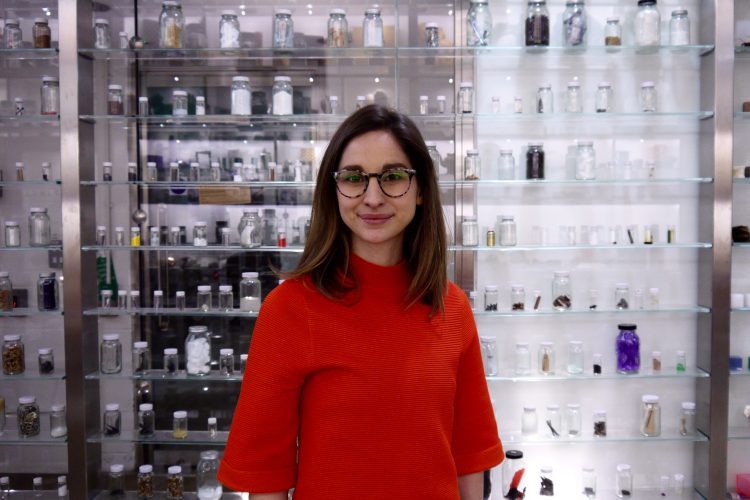
Internationally renowned universities in London also train designers, engineers, artists and craftsmen with “very strongly critical ethics”, reminds Elizabeth Corbin. “As and when they obtain their degrees, they too head towards makerspaces. There is much less of this celebration of the doing for the doing.”
Far from Yoda heads printed in 3D, follow the guide of workshops where the elite of makers meet.
Map of the London visit of labs:
Institute of Making: the encyclopedia
There are a lot of people in this university makerspace. The Institute of Making was built in 2013 within the University College London as a material library by Mark Miodownik, engineer specialized in materials, Martin Conreen, artist and designer, and Zoe Laughlin, multidisciplinary artist and researcher. The idea was then to remedy “the lack of understanding of what constructs a thing, explains Elizabeth Corbin, not only its physical characteristic but also how it is made.”
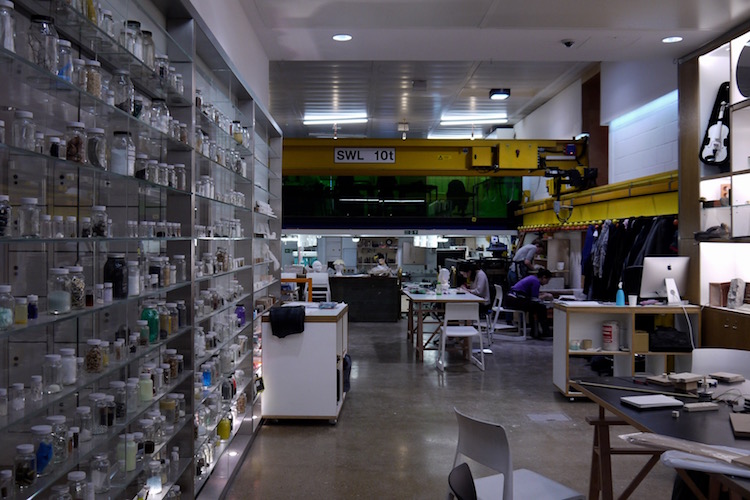
The material library, that groups more than 2,000 materials, has become a workshop as of yesterday. On a few hundred square meters, several work spaces (pottery, wood, metal, digital fabrication), where around 3,000 members are welcomed.
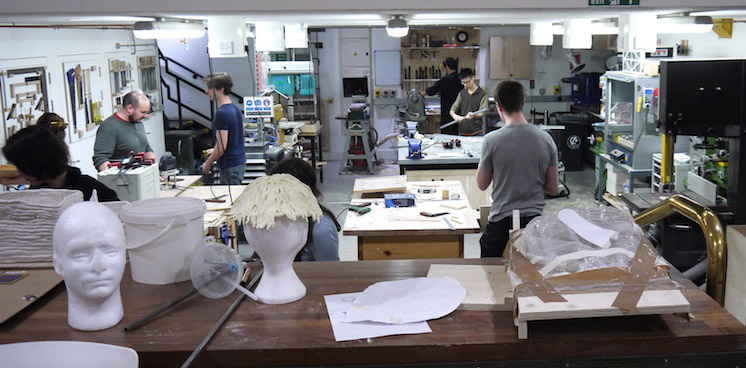
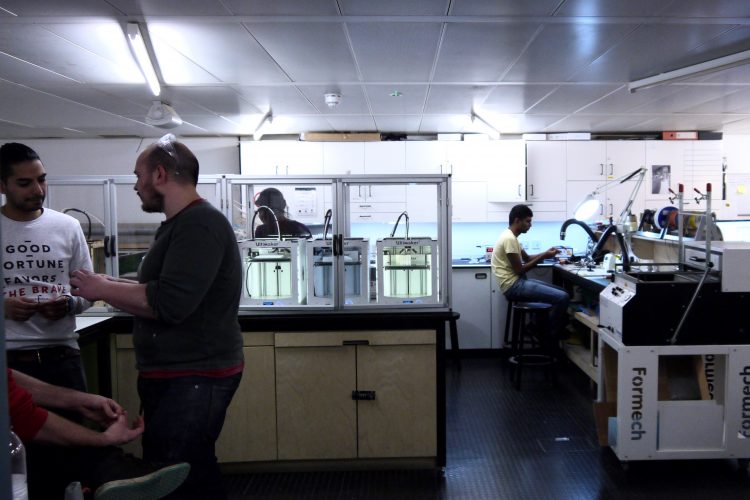
Even though the IoM is only open (free of charge) to the staff and students of the university, the public can keep an eye out for events open to all.
Institute of Making, University College London, London, WC1E 7JE. Open according to events.
South London Makerspace: the associative
Under the Southern railroad, in a rather dark lane, hides the South London Makerspace, lair of DIY and associative spirit. The place was created three years ago by three buddies. “When we arrived, there were no walls, water was dripping from the ceiling and the floor was uncovered,” says Joe Atkin, one of earliest members of the association. The place has since been refurbished, thanks to members’ volunteer work.

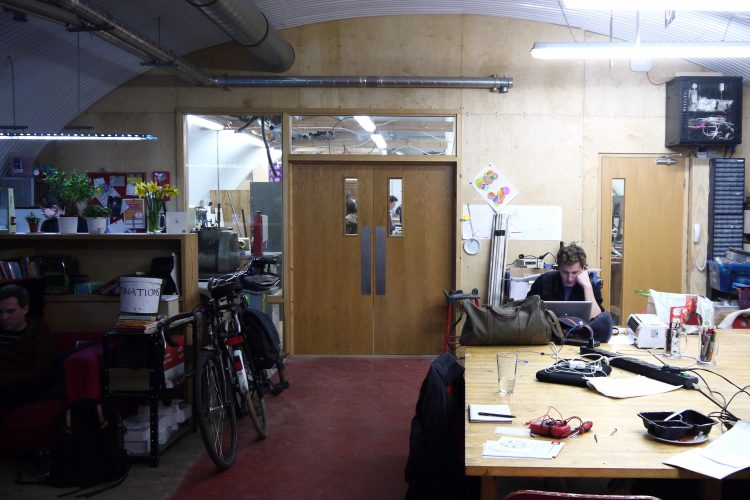
Here, trust and the sharing spirit are the priority. The workshop is open 24 hours, 7 days a week thanks to a system of keys made available to members (subject to being recommended by another member) and the subscription only costs £20 per month (about €23). At that price, the work done has to be non commercial (forbidden to draw benefits).
South London Makerspace, Arch 1129, 41 Norwood Road, London, SE24 9AJ. Open every day, 24 hours.
Hubworkshop: the solitary maker
Before being a maker, Drew Munden worked in seizure of assets. Tired of “the business world,” he decides to throw himself into fabrication. After a visit to San Francisco and its Techshop, he tells himself there is a market to capture by targeting artists and designers. His space turns out to be too small in the end to welcome several people and Munden rapidly changes his business model. Above all, “we focused on CNC fabrication. It allowed us to work with our largest clients and change from the membership system that is time consuming and involves many different projects and processes,” he explains.
Even though he lets a few former members use the machines in self-service, he mostly made his services available to his clients and registered with the Opendesk network. He hopes to open another space soon where he wishes to lead workshops for a larger public.

Hub Workshop, Unit 9E2 133 Copeland Road, London, SE15 3SN. Not open to the public.
Blackhorse Workshop: the hybrid
We head to the north of the city, in an industrial district in complete regeneration. The Blackhorse Workshop (not to be mistaken with the Blackhorse Lane Atelier, several hundred meters away and specialized in jeans) also underwent a rejuvenation: in the entrance, an extension has just been built by the collaborative architects Assemble, winners of the Turner Prize.
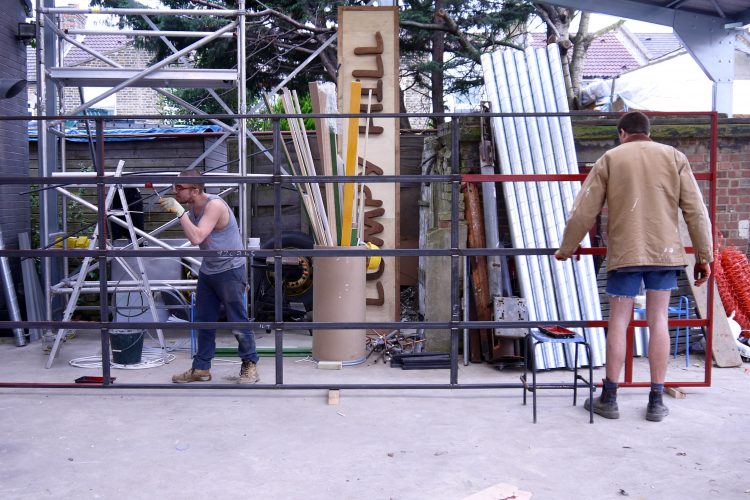
And yet the workshop was already huge. A true labyrinth of machines room, professional workshops to shape wood and metal, shared offices and studios to host architects, stage designers, designers, artists or amateur DIYers. For the moment, no digital fabrication tools but “we are thinking about it,” says Lola Akodu, in charge of marketing and events, who is giving us a tour.
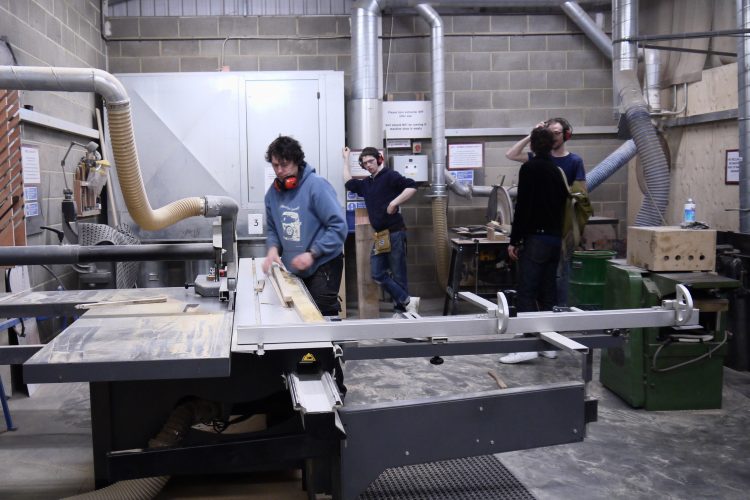

The workshop is open to all, professionals and amateurs, for durations from half a day to several months. For curious people, visits are organized on Saturdays.
Blackhorse Workshop, 2 Sutherland Rd, Walthamstow, London E17 6BX. Open Monday to Saturday, from 9.30am to 5.30pm.
Building Bloqs: the professional
We knew from the start we sometimes had to get off the beaten track to be surprised. Building Bloqs confirmed this. Subway, train then a walk through a national park, here we are at Building Bloqs, at the heart of a rather worn industrial park.

Being way out of the center, is in the DNA of Building Bloqs: its five founders created it after being ousted from their workshop in Hackney, East London, that they already shared between friends and acquaintances. They finally decided to set up house in this former furniture factory, admittedly far away, but that can host around 3,500m2 of workshops.
Open in 2012, the business is operational. The accounts are balanced and the business functions without help from the State or public authorities. “It’s part of our ethos, being totally independent,” explains Al Parra, co-founder.

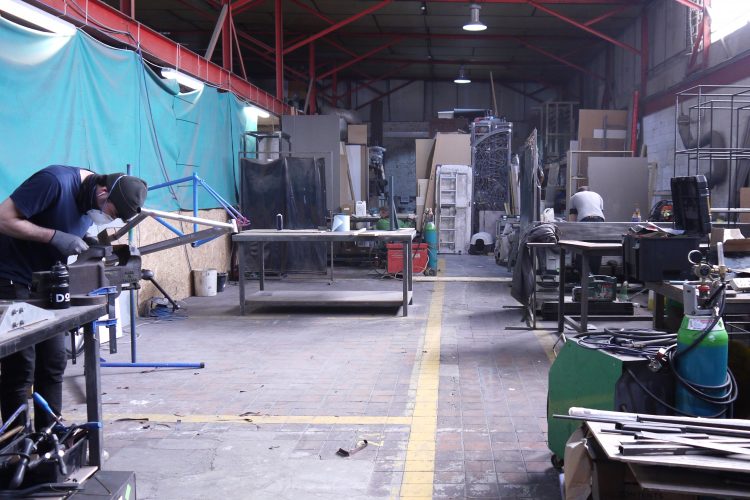
They are today 300 members, all professionals (the others are redirected towards other more appropriate workshops like Blackhorse). Most importantly, Building Bloqs is a “proof of concept,” explains Al Parra. The team is about to open a new project not far from there, on the other side of the canal: 55,000m2 for “the biggest open workshop in Europe,” he says. You will find activities turned towards electronics, prototyping and assembling, on top of an ecosystem to support makers (accounting, legal, etc.). To be followed.
Building Bloqs, 4 Anthony Way, London N18 3QT. Open Monday to Friday from 8.30am to 8pm and Saturday from 10am to 7pm.
Machines Room: the committed maker
Back to the center of the British capital, a few steps away from Victoria park and its canals. We are in the “maker mile”, district where are located the technological businesses affiliated to the maker movement—the open source furniture of Opendesk, the fun technology of Technology Will Save Us…—but also craftsmen (coffee makers among others) and more traditional makers such as steelworkers.
At the heart of this neuralgic center of new generation industry, Machines Room, a dynamic fablab founded by Thomas Ermacora, architect and entrepreneur interested in the future of the city. In this MIT certified fablab taking part in the Fabcity initiative, one is therefore interested “in the future of fabrication, its distribution and its redistribution,” summarizes Nat Hunter, director of strategy.
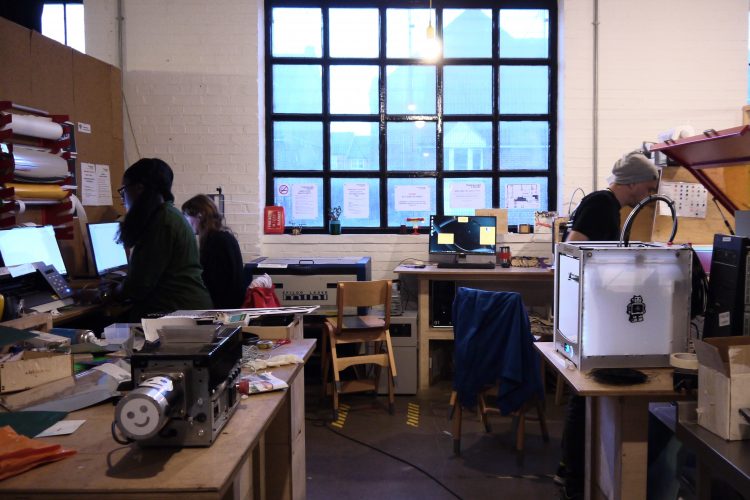
Here, many projects, starting with “makers in residence”, invited by the fablab to develop their projects and share them with the community. The proximity of Opendesk also makes the makers of Machines Room ideal partners.
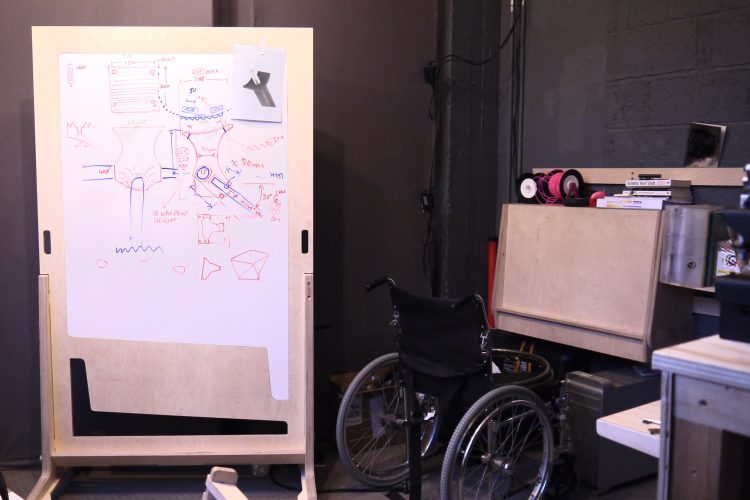
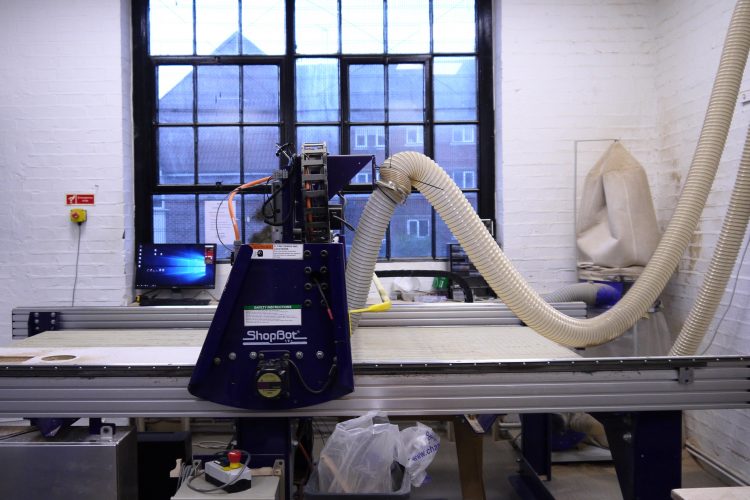
Even though the fablab functions today thanks to the financial support of Ermacora, they will soon need to balance the books. Especially since the building has been purchased and that Machines Room now has one year to move out. London laws…
Machines Room, 45 Vyner St, London E2 9DQ. Open Monday to Friday from 10am to 6pm and Wednesdays from 1pm to 9pm.
Fablab London: the technical
Fablab London is also in the process of moving. After three years spent in the heart of city, at Bank on the Thames river bank, the two founders Tony Fish and Andrew Gregson also had to look for new premises. It was in smart Notting Hill, in the West, that the fablab found refuge.

Set up in a room adjoining Eagle Lab, a co-working space sponsored by a bank where most of the businesses make hardware (connected objects, water purifiers…), the fablab is available to co-workers as well as to the general public.

Within a few months, the fablab should move in at Here East, gigantic technological hub in the Olympic park, inaugurated in January 2017.
Fablab London, 81 Palace Gardens Terrace, Notting Hill, London W8 4AT. Open Monday to Friday from 9am to 5pm.
London Hackspace & Biohackspace: the mysterious
The problem with hackers, is that you need to follow very precise rules. When we went to the London Hackspace without a formal interview request, we were kindly told to come back with an authorization. We are still waiting for an answer…If you are not planning to disturb the members of the hackerspace, we recommend anyway you take a look around. There are a lot of people and enough to DIY.
We still visited the Biohackspace, in the basement, founded in 2011, the goal of which is to “allow those who do not have access to a lab to learn the basic techniques of modern microbiology and those who work in a lab to improve their knowledge,” explains Nicholas Fitzroy-Dale, one of the co-founders.
The lab has forty so so members who are working on numerous projects: blood grouping, genetic modification of bacteria or still the observation of water bears (or tardigrades). The group also started a series of workshops on molecular biology.

London Backspace and Biohackpace, 447 Hackney Rd, London E2 9DY. Open to members 24 hours and 7 days a week.
Makerversity: the creative incubator
It’s in an emblematic place of creative London that we finish our visit: Somerset House, facility of exhibition rooms, conferences, artist studios and cafés on the banks of the river Thames. Here we find Makerversity, kind of incubator of maker start-ups “in the broad sense”, clarifies Esther Ellard, community manager.

The place was created four years ago by four founders, Paul Smyth, Andy Merritt, Tom Tobia, Joe Smith, all involved in the ecosystem of start-ups. The premises were at that time abandoned and the founders obtained them at a low cost to refurbish them, settle in and contribute to the cultural program of Somerset House, either by helping artists make what they need, either by exhibiting their work themselves.
The maker factory now welcomes 250 members for 80 businesses, among which Fairphone, making ethical mobile phones, a business of spectacle manufacturing in 3D printing or still the hackathon organizers Hackitarians.


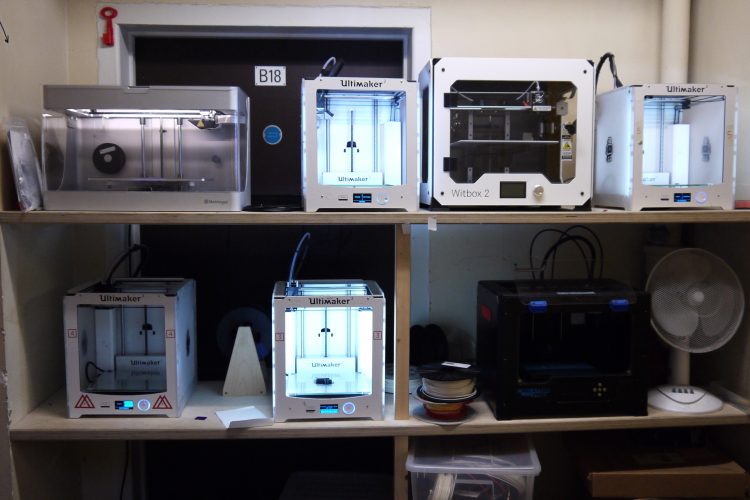
The team also launched a branch in Amsterdam in April 2016.
Makerversity, Old Post Room, Somerset House, Victoria Embankment, London, WC2R 1LA. Open to members only.
